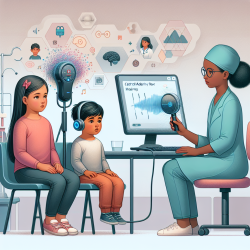Understanding the significance of Central Auditory Tests (CATs) in predicting neurocognitive performance is a game-changer, especially for children living with HIV (CLWH). This research underscores that CATs can be as effective, if not more so, than traditional predictors such as education. For practitioners, this means that implementing CATs early in a child's life can offer critical insights into their future cognitive abilities.
Here's a closer look at the findings and how they can be applied to enhance our practice:
The Study at a Glance
The study involved administering CATs to children aged 3-10 years in Dar es Salaam, Tanzania. Using machine learning models, researchers examined whether early CAT performance could predict later neurocognitive function, as measured by the Leiter-3 test composites (Nonverbal IQ, Processing Speed, and Nonverbal Attention/Memory).
- CATs demonstrated predictive ability for Nonverbal IQ and Processing Speed composites.
- Machine learning models using CATs achieved high predictive capabilities.
- CATs outperformed traditional predictors in some cases.
Implementing CATs in Practice
For practitioners, the implications are profound. Here’s how you can integrate these findings into your practice:
- Early Screening: Incorporate CATs in early childhood assessments to identify potential neurocognitive deficits.
- Data-Driven Decisions: Use machine learning models to analyze CAT data alongside traditional predictors like education to enhance predictive accuracy.
- Targeted Interventions: Develop intervention plans based on CAT results to address specific neurocognitive challenges early.
Encouraging Further Research
While this study provides a solid foundation, it also highlights the need for further research. Expanding sample sizes and exploring the long-term predictive power of CATs can refine our understanding and application of these tests. Practitioners are encouraged to participate in or initiate studies that build on these findings.
Conclusion
By integrating CATs into our practice, we can make data-driven decisions that significantly impact children's neurocognitive development, especially for those living with HIV. Early detection and intervention are crucial, and CATs offer a valuable tool in achieving this goal.
To read the original research paper, please follow this link: Central auditory test performance predicts future neurocognitive function in children living with and without HIV.










